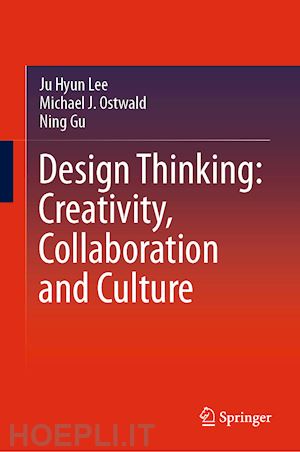
Questo prodotto usufruisce delle SPEDIZIONI GRATIS
selezionando l'opzione Corriere Veloce in fase di ordine.
Pagabile anche con Carta della cultura giovani e del merito, 18App Bonus Cultura e Carta del Docente
This book presents new ways of facilitating design thinking, through the combination of cognitive design strategies and information technologies. It provides readers with an in-depth understanding of the traditional and digital design processes and activities that are employed in architecture, computational design, communication design and graphic design.
The book is divided into three parts: Part I, which focuses on creativity, uses evidence derived from empirical studies to develop an understanding of the way computational environments shape design thinking and may lead to more inventive outcomes. Part II considers the cognitive dimensions of design teams, crowds and collectives. It investigates the ways digital design platforms promote interactive and collective thinking. Lastly, Part III addresses culture, examining the linguistic and cultural context of the globalised design ecosystem.
Providing valuable insights into design thinking, this book helps readers engage with their local and global environments. It will appeal to academics, researchers and professionals with an interest in understanding design thinking in the context of creativity, collaboration and culture.
Dr Ju Hyun Lee is a Scientia Fellow and Senior Lecturer in the Faculty of the Built Environment, UNSW Sydney. Ju Hyun has made significant contributions to the fields of architectural and computational design, since his first lecturing position (Digital Design) in 2003, South Korea. Ju Hyun was invited to become a visiting academic at the University of Newcastle in 2011, where he was a senior lecturer and completed five-years of post-doctoral studies in design computing and cognition. He was a senior research fellow at the University of South Australia in 2018. He is co-author with Michael J. Ostwald of Grammatical and Syntactical Approaches in Architecture (IGI Global 2020). Ju Hyun has led two externally funded research projects, supported by OLT and DFAT, in Australia.
Professor Michael J. Ostwald is Associate Dean of Research and Professor of Architecture at UNSW, Sydney. He has a PhD in architectural history and theory and a DSc in design mathematics and computing. Michael is Co-Editor-in-Chief of the Nexus Network Journal: Architecture and Mathematics (Springer) and on the editorial boards of ARQ (Cambridge) and Architectural Theory Review (Taylor and Francis). He is co-editor with Kim Williams of Architecture and Mathematics from Antiquity to the Future (Springer 2015), co-author with Josephine Vaughan of The Fractal Dimension of Architecture (Birkhäuser 2016), co-author with Michael J. Dawes of The Mathematics of the Modernist Villa (Birkhäuser 2018) and co-author with Ju Hyun Lee of Grammatical and Syntactical Approaches in Architecture (IGI Global 2020).
Dr Ning Gu is Professor in Architecture at UniSA Creative, University of South Australia (UniSA). He is Deputy Director of the Australian Research Centre for Interactive and Virtual Environments (IVE). Professor Gu’s most significant research contributions have been made in design computing and cognition. The outcomes of his research have been documented in over 180 peer-reviewed publications. Professor Gu’s research has been supported by prestigious research funding schemes from the Australian Research Council, Office for Learning and Teaching and Cooperative Research Centres. He is an Associate Editor of Architectural Science Review (Taylor and Francis) and has guest edited/chaired major international journals/conferences in the field.











Il sito utilizza cookie ed altri strumenti di tracciamento che raccolgono informazioni dal dispositivo dell’utente. Oltre ai cookie tecnici ed analitici aggregati, strettamente necessari per il funzionamento di questo sito web, previo consenso dell’utente possono essere installati cookie di profilazione e marketing e cookie dei social media. Cliccando su “Accetto tutti i cookie” saranno attivate tutte le categorie di cookie. Per accettare solo deterninate categorie di cookie, cliccare invece su “Impostazioni cookie”. Chiudendo il banner o continuando a navigare saranno installati solo cookie tecnici. Per maggiori dettagli, consultare la Cookie Policy.